Comprehensive Report on Entrepreneurship and Small Business Unit 9
VerifiedAdded on 2023/01/05
|18
|4579
|60
Report
AI Summary
This report provides a detailed analysis of entrepreneurship and small business management, beginning with a discussion of different types of entrepreneurial ventures, including social, small, large, and scalable ventures, and their relation to various typologies like lifestyle entrepreneurship. It highlights similarities and differences among these ventures based on factors such as profit, scope, and innovation. The report then examines the significant impact of micro and small businesses on the economy, emphasizing their contributions to employment, turnover, and overall business numbers, particularly within the UK. Furthermore, it explores the importance of small businesses and start-ups in fostering the growth of the social economy through employment, tax contributions, and innovation. The report also identifies characteristic traits and skills of successful entrepreneurs, differentiating them from typical business managers, and reflects on entrepreneurial motivation and mindset through aspects of the entrepreneurial personality. Finally, it considers factors that either hinder or foster entrepreneurship based on background and experience.

Unit 9 Entrepreneurship and
small business management
small business management
Paraphrase This Document
Need a fresh take? Get an instant paraphrase of this document with our AI Paraphraser
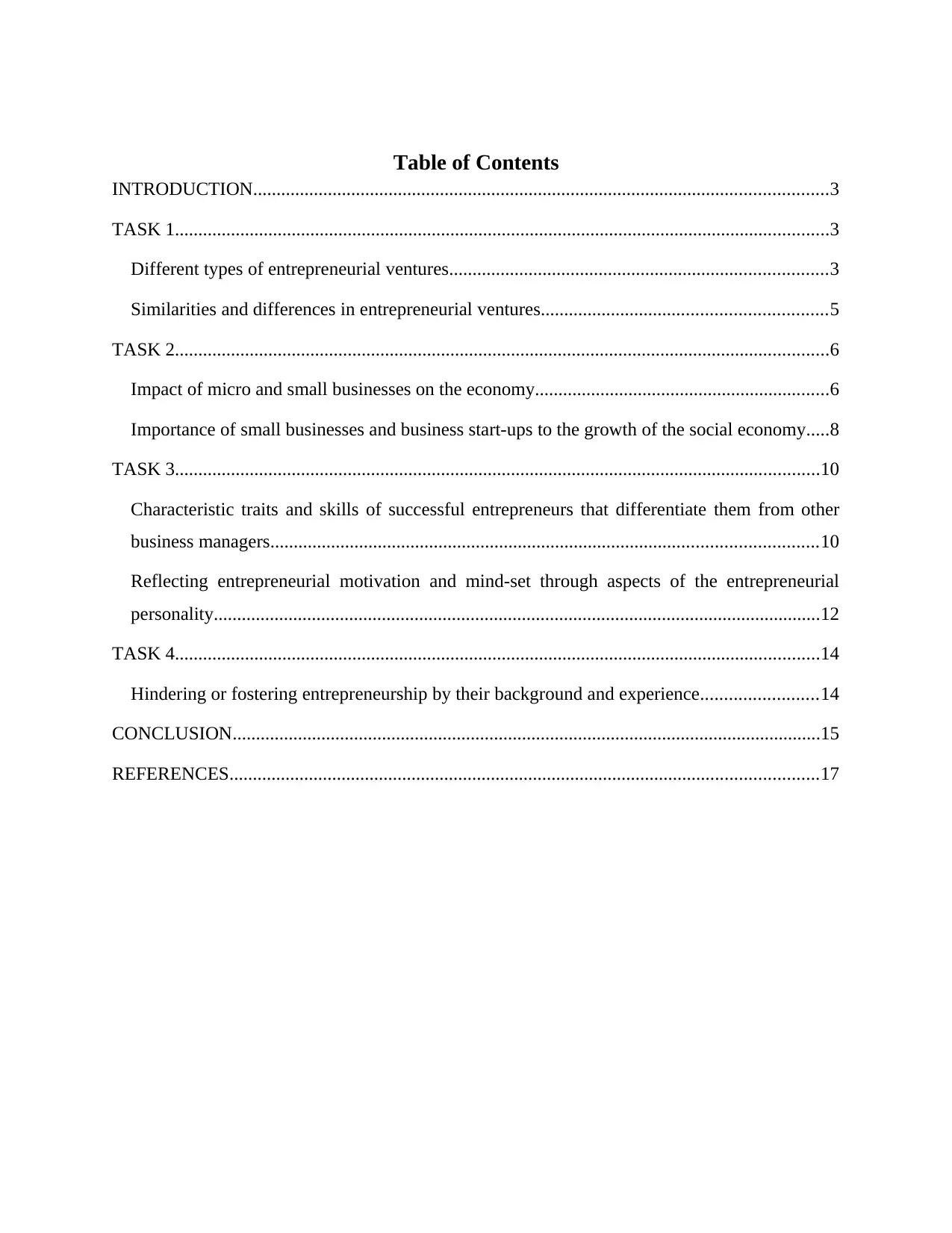
Table of Contents
INTRODUCTION...........................................................................................................................3
TASK 1............................................................................................................................................3
Different types of entrepreneurial ventures.................................................................................3
Similarities and differences in entrepreneurial ventures.............................................................5
TASK 2............................................................................................................................................6
Impact of micro and small businesses on the economy...............................................................6
Importance of small businesses and business start-ups to the growth of the social economy.....8
TASK 3..........................................................................................................................................10
Characteristic traits and skills of successful entrepreneurs that differentiate them from other
business managers.....................................................................................................................10
Reflecting entrepreneurial motivation and mind-set through aspects of the entrepreneurial
personality..................................................................................................................................12
TASK 4..........................................................................................................................................14
Hindering or fostering entrepreneurship by their background and experience.........................14
CONCLUSION..............................................................................................................................15
REFERENCES..............................................................................................................................17
INTRODUCTION...........................................................................................................................3
TASK 1............................................................................................................................................3
Different types of entrepreneurial ventures.................................................................................3
Similarities and differences in entrepreneurial ventures.............................................................5
TASK 2............................................................................................................................................6
Impact of micro and small businesses on the economy...............................................................6
Importance of small businesses and business start-ups to the growth of the social economy.....8
TASK 3..........................................................................................................................................10
Characteristic traits and skills of successful entrepreneurs that differentiate them from other
business managers.....................................................................................................................10
Reflecting entrepreneurial motivation and mind-set through aspects of the entrepreneurial
personality..................................................................................................................................12
TASK 4..........................................................................................................................................14
Hindering or fostering entrepreneurship by their background and experience.........................14
CONCLUSION..............................................................................................................................15
REFERENCES..............................................................................................................................17
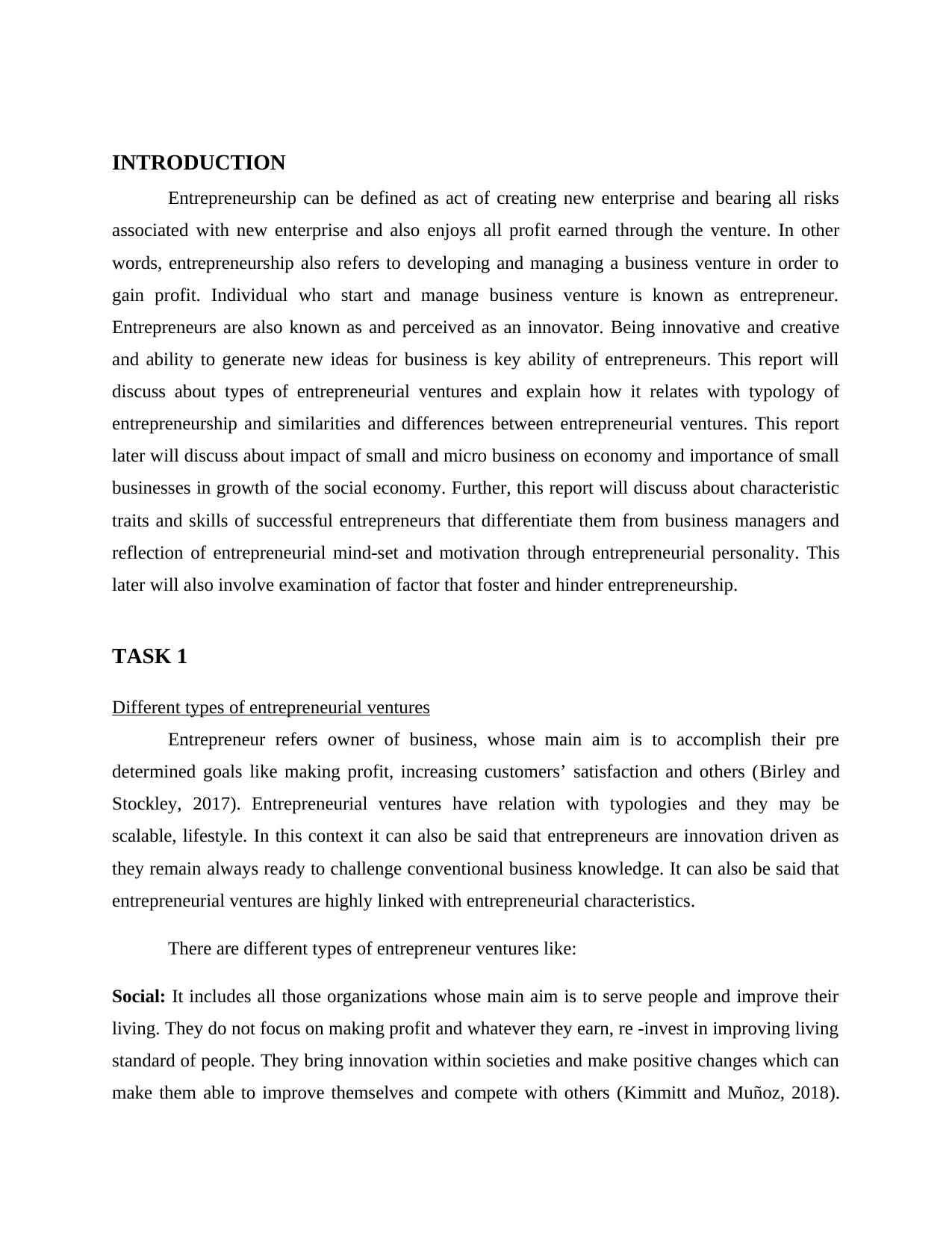
INTRODUCTION
Entrepreneurship can be defined as act of creating new enterprise and bearing all risks
associated with new enterprise and also enjoys all profit earned through the venture. In other
words, entrepreneurship also refers to developing and managing a business venture in order to
gain profit. Individual who start and manage business venture is known as entrepreneur.
Entrepreneurs are also known as and perceived as an innovator. Being innovative and creative
and ability to generate new ideas for business is key ability of entrepreneurs. This report will
discuss about types of entrepreneurial ventures and explain how it relates with typology of
entrepreneurship and similarities and differences between entrepreneurial ventures. This report
later will discuss about impact of small and micro business on economy and importance of small
businesses in growth of the social economy. Further, this report will discuss about characteristic
traits and skills of successful entrepreneurs that differentiate them from business managers and
reflection of entrepreneurial mind-set and motivation through entrepreneurial personality. This
later will also involve examination of factor that foster and hinder entrepreneurship.
TASK 1
Different types of entrepreneurial ventures
Entrepreneur refers owner of business, whose main aim is to accomplish their pre
determined goals like making profit, increasing customers’ satisfaction and others (Birley and
Stockley, 2017). Entrepreneurial ventures have relation with typologies and they may be
scalable, lifestyle. In this context it can also be said that entrepreneurs are innovation driven as
they remain always ready to challenge conventional business knowledge. It can also be said that
entrepreneurial ventures are highly linked with entrepreneurial characteristics.
There are different types of entrepreneur ventures like:
Social: It includes all those organizations whose main aim is to serve people and improve their
living. They do not focus on making profit and whatever they earn, re -invest in improving living
standard of people. They bring innovation within societies and make positive changes which can
make them able to improve themselves and compete with others (Kimmitt and Muñoz, 2018).
Entrepreneurship can be defined as act of creating new enterprise and bearing all risks
associated with new enterprise and also enjoys all profit earned through the venture. In other
words, entrepreneurship also refers to developing and managing a business venture in order to
gain profit. Individual who start and manage business venture is known as entrepreneur.
Entrepreneurs are also known as and perceived as an innovator. Being innovative and creative
and ability to generate new ideas for business is key ability of entrepreneurs. This report will
discuss about types of entrepreneurial ventures and explain how it relates with typology of
entrepreneurship and similarities and differences between entrepreneurial ventures. This report
later will discuss about impact of small and micro business on economy and importance of small
businesses in growth of the social economy. Further, this report will discuss about characteristic
traits and skills of successful entrepreneurs that differentiate them from business managers and
reflection of entrepreneurial mind-set and motivation through entrepreneurial personality. This
later will also involve examination of factor that foster and hinder entrepreneurship.
TASK 1
Different types of entrepreneurial ventures
Entrepreneur refers owner of business, whose main aim is to accomplish their pre
determined goals like making profit, increasing customers’ satisfaction and others (Birley and
Stockley, 2017). Entrepreneurial ventures have relation with typologies and they may be
scalable, lifestyle. In this context it can also be said that entrepreneurs are innovation driven as
they remain always ready to challenge conventional business knowledge. It can also be said that
entrepreneurial ventures are highly linked with entrepreneurial characteristics.
There are different types of entrepreneur ventures like:
Social: It includes all those organizations whose main aim is to serve people and improve their
living. They do not focus on making profit and whatever they earn, re -invest in improving living
standard of people. They bring innovation within societies and make positive changes which can
make them able to improve themselves and compete with others (Kimmitt and Muñoz, 2018).
⊘ This is a preview!⊘
Do you want full access?
Subscribe today to unlock all pages.

Trusted by 1+ million students worldwide
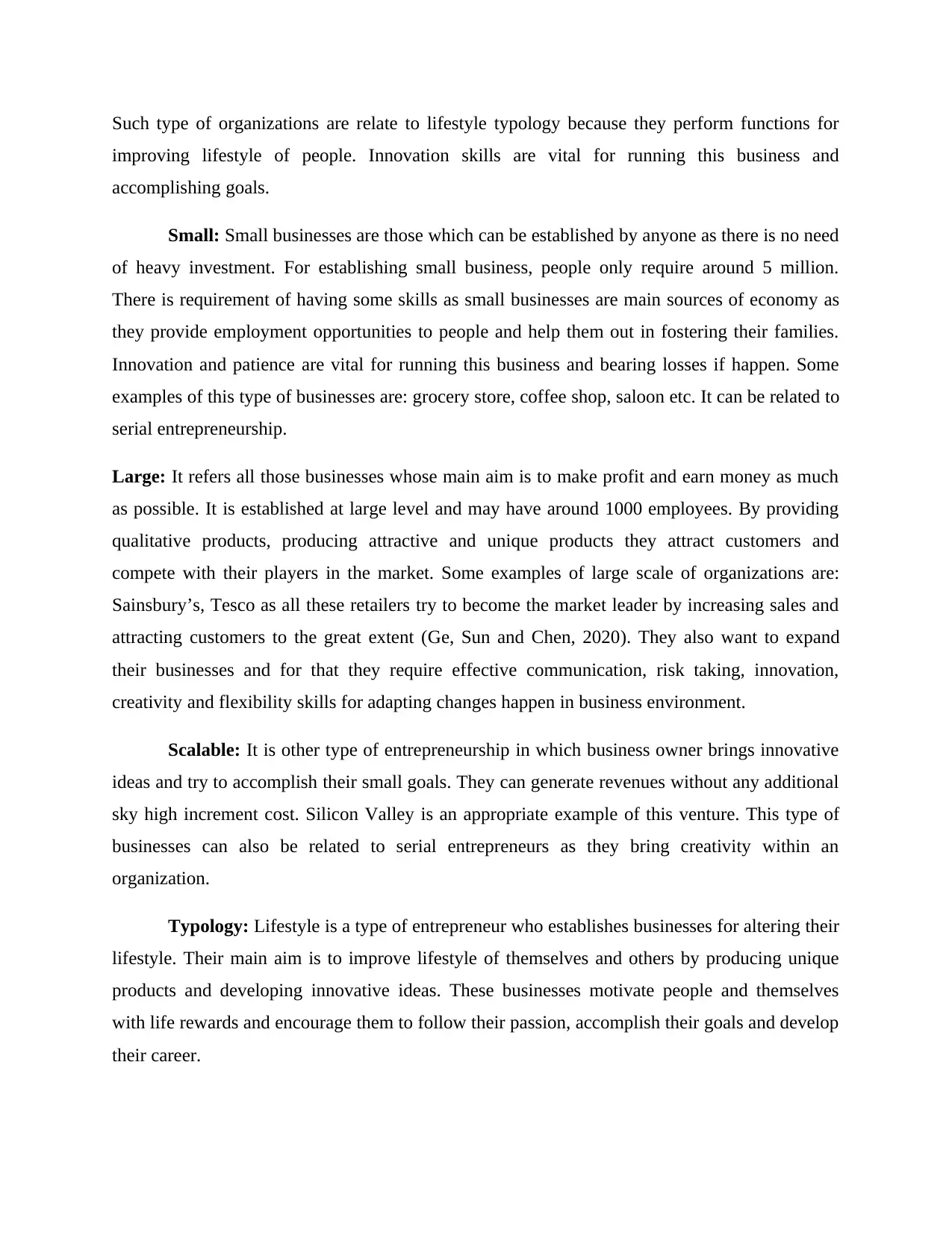
Such type of organizations are relate to lifestyle typology because they perform functions for
improving lifestyle of people. Innovation skills are vital for running this business and
accomplishing goals.
Small: Small businesses are those which can be established by anyone as there is no need
of heavy investment. For establishing small business, people only require around 5 million.
There is requirement of having some skills as small businesses are main sources of economy as
they provide employment opportunities to people and help them out in fostering their families.
Innovation and patience are vital for running this business and bearing losses if happen. Some
examples of this type of businesses are: grocery store, coffee shop, saloon etc. It can be related to
serial entrepreneurship.
Large: It refers all those businesses whose main aim is to make profit and earn money as much
as possible. It is established at large level and may have around 1000 employees. By providing
qualitative products, producing attractive and unique products they attract customers and
compete with their players in the market. Some examples of large scale of organizations are:
Sainsbury’s, Tesco as all these retailers try to become the market leader by increasing sales and
attracting customers to the great extent (Ge, Sun and Chen, 2020). They also want to expand
their businesses and for that they require effective communication, risk taking, innovation,
creativity and flexibility skills for adapting changes happen in business environment.
Scalable: It is other type of entrepreneurship in which business owner brings innovative
ideas and try to accomplish their small goals. They can generate revenues without any additional
sky high increment cost. Silicon Valley is an appropriate example of this venture. This type of
businesses can also be related to serial entrepreneurs as they bring creativity within an
organization.
Typology: Lifestyle is a type of entrepreneur who establishes businesses for altering their
lifestyle. Their main aim is to improve lifestyle of themselves and others by producing unique
products and developing innovative ideas. These businesses motivate people and themselves
with life rewards and encourage them to follow their passion, accomplish their goals and develop
their career.
improving lifestyle of people. Innovation skills are vital for running this business and
accomplishing goals.
Small: Small businesses are those which can be established by anyone as there is no need
of heavy investment. For establishing small business, people only require around 5 million.
There is requirement of having some skills as small businesses are main sources of economy as
they provide employment opportunities to people and help them out in fostering their families.
Innovation and patience are vital for running this business and bearing losses if happen. Some
examples of this type of businesses are: grocery store, coffee shop, saloon etc. It can be related to
serial entrepreneurship.
Large: It refers all those businesses whose main aim is to make profit and earn money as much
as possible. It is established at large level and may have around 1000 employees. By providing
qualitative products, producing attractive and unique products they attract customers and
compete with their players in the market. Some examples of large scale of organizations are:
Sainsbury’s, Tesco as all these retailers try to become the market leader by increasing sales and
attracting customers to the great extent (Ge, Sun and Chen, 2020). They also want to expand
their businesses and for that they require effective communication, risk taking, innovation,
creativity and flexibility skills for adapting changes happen in business environment.
Scalable: It is other type of entrepreneurship in which business owner brings innovative
ideas and try to accomplish their small goals. They can generate revenues without any additional
sky high increment cost. Silicon Valley is an appropriate example of this venture. This type of
businesses can also be related to serial entrepreneurs as they bring creativity within an
organization.
Typology: Lifestyle is a type of entrepreneur who establishes businesses for altering their
lifestyle. Their main aim is to improve lifestyle of themselves and others by producing unique
products and developing innovative ideas. These businesses motivate people and themselves
with life rewards and encourage them to follow their passion, accomplish their goals and develop
their career.
Paraphrase This Document
Need a fresh take? Get an instant paraphrase of this document with our AI Paraphraser
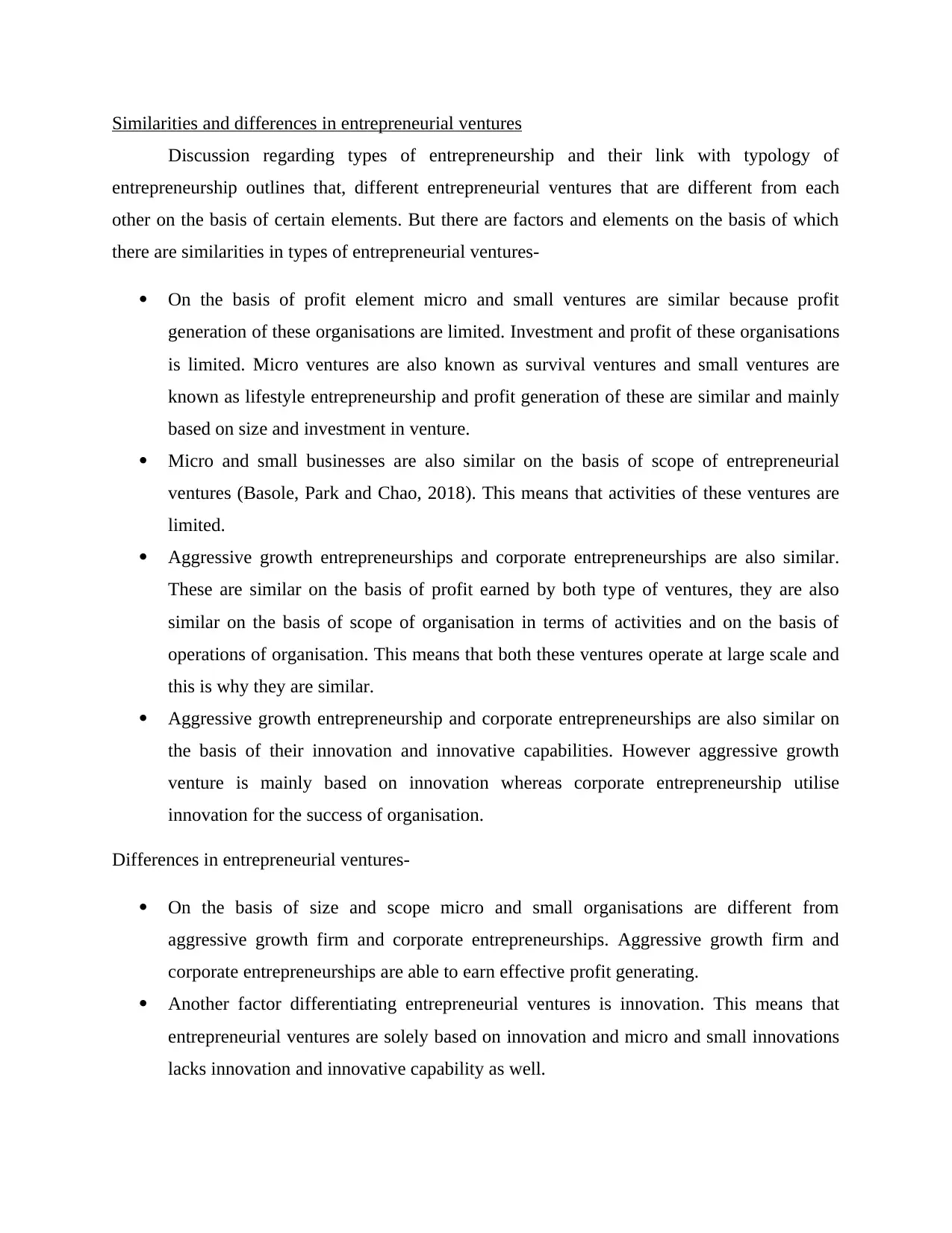
Similarities and differences in entrepreneurial ventures
Discussion regarding types of entrepreneurship and their link with typology of
entrepreneurship outlines that, different entrepreneurial ventures that are different from each
other on the basis of certain elements. But there are factors and elements on the basis of which
there are similarities in types of entrepreneurial ventures-
On the basis of profit element micro and small ventures are similar because profit
generation of these organisations are limited. Investment and profit of these organisations
is limited. Micro ventures are also known as survival ventures and small ventures are
known as lifestyle entrepreneurship and profit generation of these are similar and mainly
based on size and investment in venture.
Micro and small businesses are also similar on the basis of scope of entrepreneurial
ventures (Basole, Park and Chao, 2018). This means that activities of these ventures are
limited.
Aggressive growth entrepreneurships and corporate entrepreneurships are also similar.
These are similar on the basis of profit earned by both type of ventures, they are also
similar on the basis of scope of organisation in terms of activities and on the basis of
operations of organisation. This means that both these ventures operate at large scale and
this is why they are similar.
Aggressive growth entrepreneurship and corporate entrepreneurships are also similar on
the basis of their innovation and innovative capabilities. However aggressive growth
venture is mainly based on innovation whereas corporate entrepreneurship utilise
innovation for the success of organisation.
Differences in entrepreneurial ventures-
On the basis of size and scope micro and small organisations are different from
aggressive growth firm and corporate entrepreneurships. Aggressive growth firm and
corporate entrepreneurships are able to earn effective profit generating.
Another factor differentiating entrepreneurial ventures is innovation. This means that
entrepreneurial ventures are solely based on innovation and micro and small innovations
lacks innovation and innovative capability as well.
Discussion regarding types of entrepreneurship and their link with typology of
entrepreneurship outlines that, different entrepreneurial ventures that are different from each
other on the basis of certain elements. But there are factors and elements on the basis of which
there are similarities in types of entrepreneurial ventures-
On the basis of profit element micro and small ventures are similar because profit
generation of these organisations are limited. Investment and profit of these organisations
is limited. Micro ventures are also known as survival ventures and small ventures are
known as lifestyle entrepreneurship and profit generation of these are similar and mainly
based on size and investment in venture.
Micro and small businesses are also similar on the basis of scope of entrepreneurial
ventures (Basole, Park and Chao, 2018). This means that activities of these ventures are
limited.
Aggressive growth entrepreneurships and corporate entrepreneurships are also similar.
These are similar on the basis of profit earned by both type of ventures, they are also
similar on the basis of scope of organisation in terms of activities and on the basis of
operations of organisation. This means that both these ventures operate at large scale and
this is why they are similar.
Aggressive growth entrepreneurship and corporate entrepreneurships are also similar on
the basis of their innovation and innovative capabilities. However aggressive growth
venture is mainly based on innovation whereas corporate entrepreneurship utilise
innovation for the success of organisation.
Differences in entrepreneurial ventures-
On the basis of size and scope micro and small organisations are different from
aggressive growth firm and corporate entrepreneurships. Aggressive growth firm and
corporate entrepreneurships are able to earn effective profit generating.
Another factor differentiating entrepreneurial ventures is innovation. This means that
entrepreneurial ventures are solely based on innovation and micro and small innovations
lacks innovation and innovative capability as well.
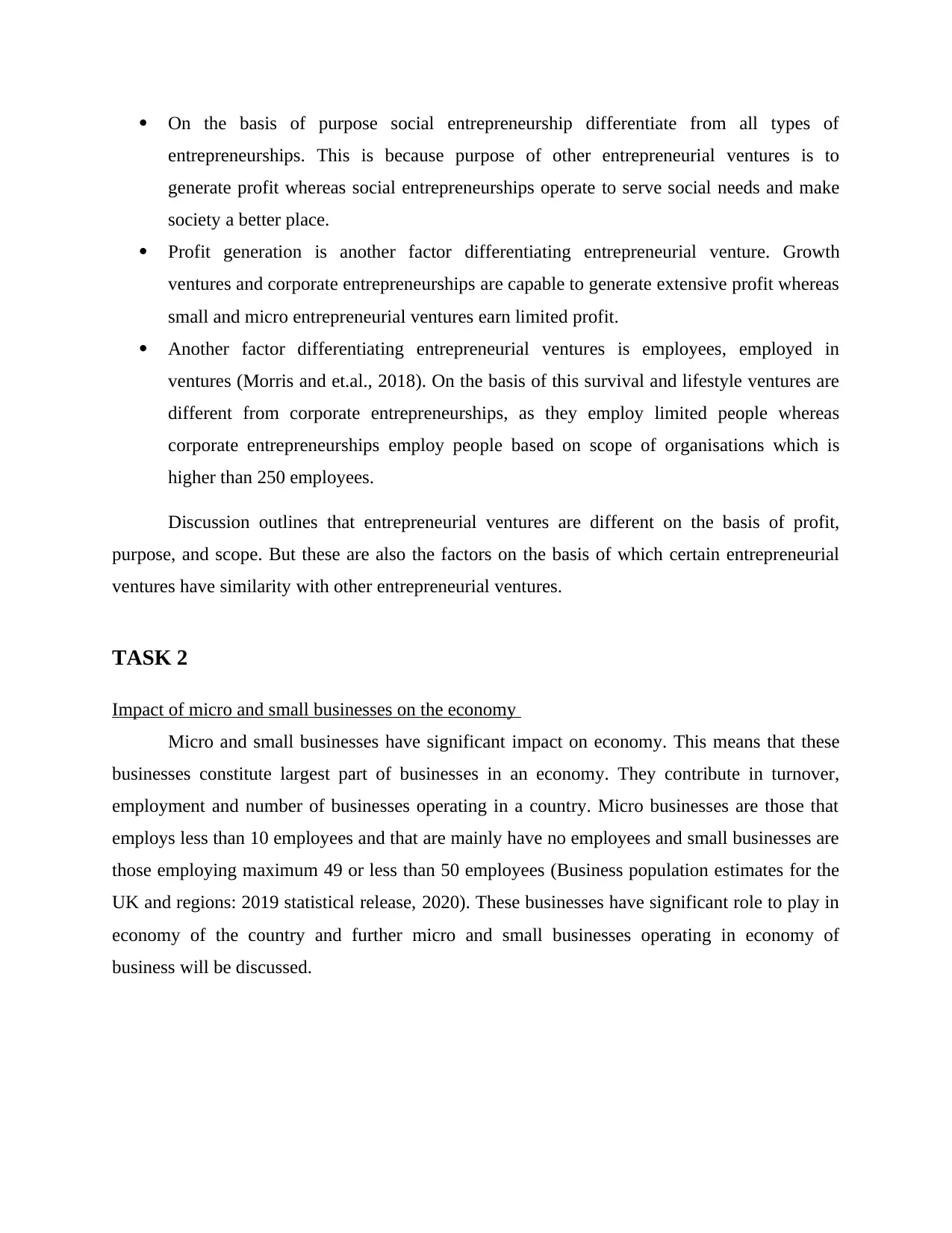
On the basis of purpose social entrepreneurship differentiate from all types of
entrepreneurships. This is because purpose of other entrepreneurial ventures is to
generate profit whereas social entrepreneurships operate to serve social needs and make
society a better place.
Profit generation is another factor differentiating entrepreneurial venture. Growth
ventures and corporate entrepreneurships are capable to generate extensive profit whereas
small and micro entrepreneurial ventures earn limited profit.
Another factor differentiating entrepreneurial ventures is employees, employed in
ventures (Morris and et.al., 2018). On the basis of this survival and lifestyle ventures are
different from corporate entrepreneurships, as they employ limited people whereas
corporate entrepreneurships employ people based on scope of organisations which is
higher than 250 employees.
Discussion outlines that entrepreneurial ventures are different on the basis of profit,
purpose, and scope. But these are also the factors on the basis of which certain entrepreneurial
ventures have similarity with other entrepreneurial ventures.
TASK 2
Impact of micro and small businesses on the economy
Micro and small businesses have significant impact on economy. This means that these
businesses constitute largest part of businesses in an economy. They contribute in turnover,
employment and number of businesses operating in a country. Micro businesses are those that
employs less than 10 employees and that are mainly have no employees and small businesses are
those employing maximum 49 or less than 50 employees (Business population estimates for the
UK and regions: 2019 statistical release, 2020). These businesses have significant role to play in
economy of the country and further micro and small businesses operating in economy of
business will be discussed.
entrepreneurships. This is because purpose of other entrepreneurial ventures is to
generate profit whereas social entrepreneurships operate to serve social needs and make
society a better place.
Profit generation is another factor differentiating entrepreneurial venture. Growth
ventures and corporate entrepreneurships are capable to generate extensive profit whereas
small and micro entrepreneurial ventures earn limited profit.
Another factor differentiating entrepreneurial ventures is employees, employed in
ventures (Morris and et.al., 2018). On the basis of this survival and lifestyle ventures are
different from corporate entrepreneurships, as they employ limited people whereas
corporate entrepreneurships employ people based on scope of organisations which is
higher than 250 employees.
Discussion outlines that entrepreneurial ventures are different on the basis of profit,
purpose, and scope. But these are also the factors on the basis of which certain entrepreneurial
ventures have similarity with other entrepreneurial ventures.
TASK 2
Impact of micro and small businesses on the economy
Micro and small businesses have significant impact on economy. This means that these
businesses constitute largest part of businesses in an economy. They contribute in turnover,
employment and number of businesses operating in a country. Micro businesses are those that
employs less than 10 employees and that are mainly have no employees and small businesses are
those employing maximum 49 or less than 50 employees (Business population estimates for the
UK and regions: 2019 statistical release, 2020). These businesses have significant role to play in
economy of the country and further micro and small businesses operating in economy of
business will be discussed.
⊘ This is a preview!⊘
Do you want full access?
Subscribe today to unlock all pages.

Trusted by 1+ million students worldwide
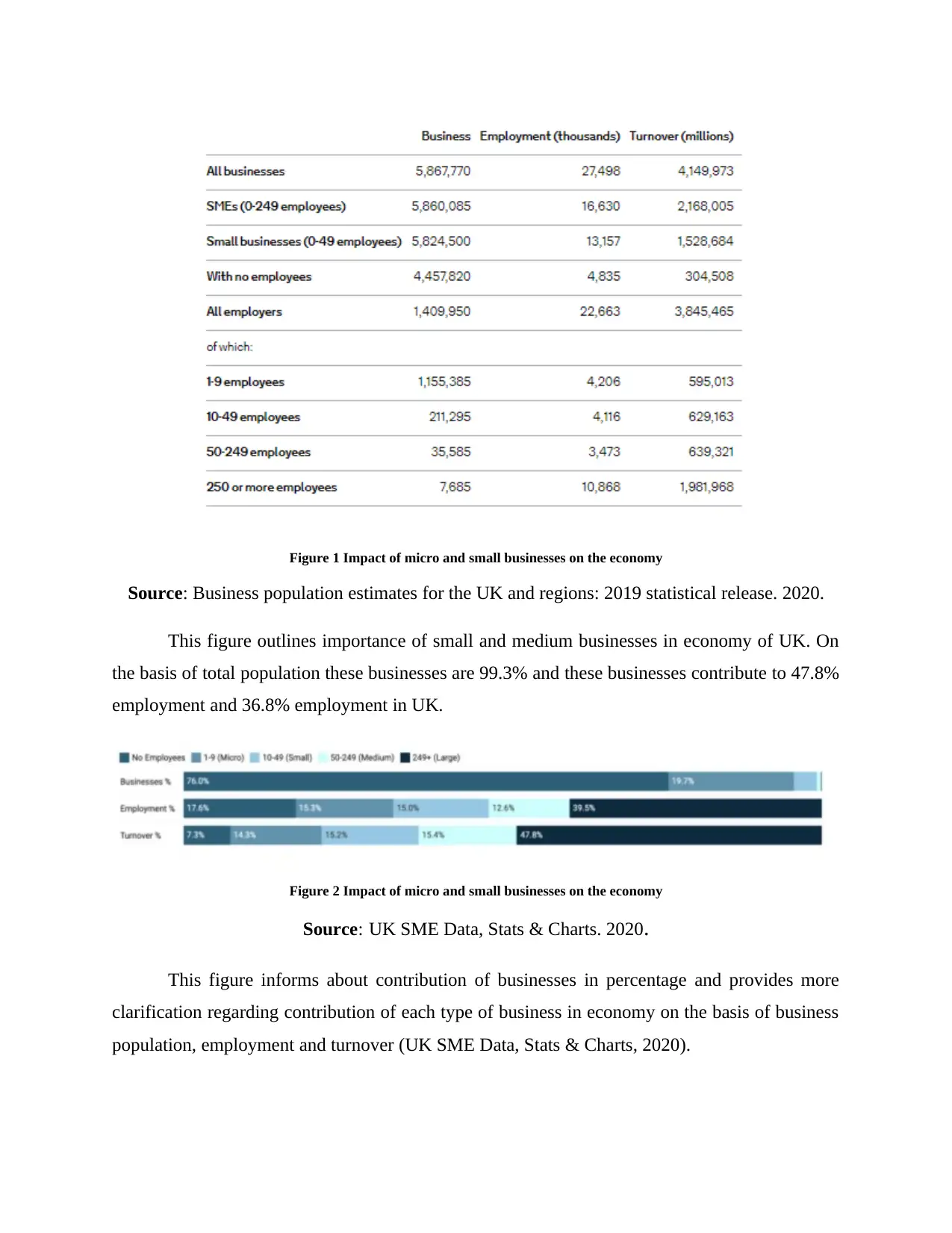
Figure 1 Impact of micro and small businesses on the economy
Source: Business population estimates for the UK and regions: 2019 statistical release. 2020.
This figure outlines importance of small and medium businesses in economy of UK. On
the basis of total population these businesses are 99.3% and these businesses contribute to 47.8%
employment and 36.8% employment in UK.
Figure 2 Impact of micro and small businesses on the economy
Source: UK SME Data, Stats & Charts. 2020.
This figure informs about contribution of businesses in percentage and provides more
clarification regarding contribution of each type of business in economy on the basis of business
population, employment and turnover (UK SME Data, Stats & Charts, 2020).
Source: Business population estimates for the UK and regions: 2019 statistical release. 2020.
This figure outlines importance of small and medium businesses in economy of UK. On
the basis of total population these businesses are 99.3% and these businesses contribute to 47.8%
employment and 36.8% employment in UK.
Figure 2 Impact of micro and small businesses on the economy
Source: UK SME Data, Stats & Charts. 2020.
This figure informs about contribution of businesses in percentage and provides more
clarification regarding contribution of each type of business in economy on the basis of business
population, employment and turnover (UK SME Data, Stats & Charts, 2020).
Paraphrase This Document
Need a fresh take? Get an instant paraphrase of this document with our AI Paraphraser
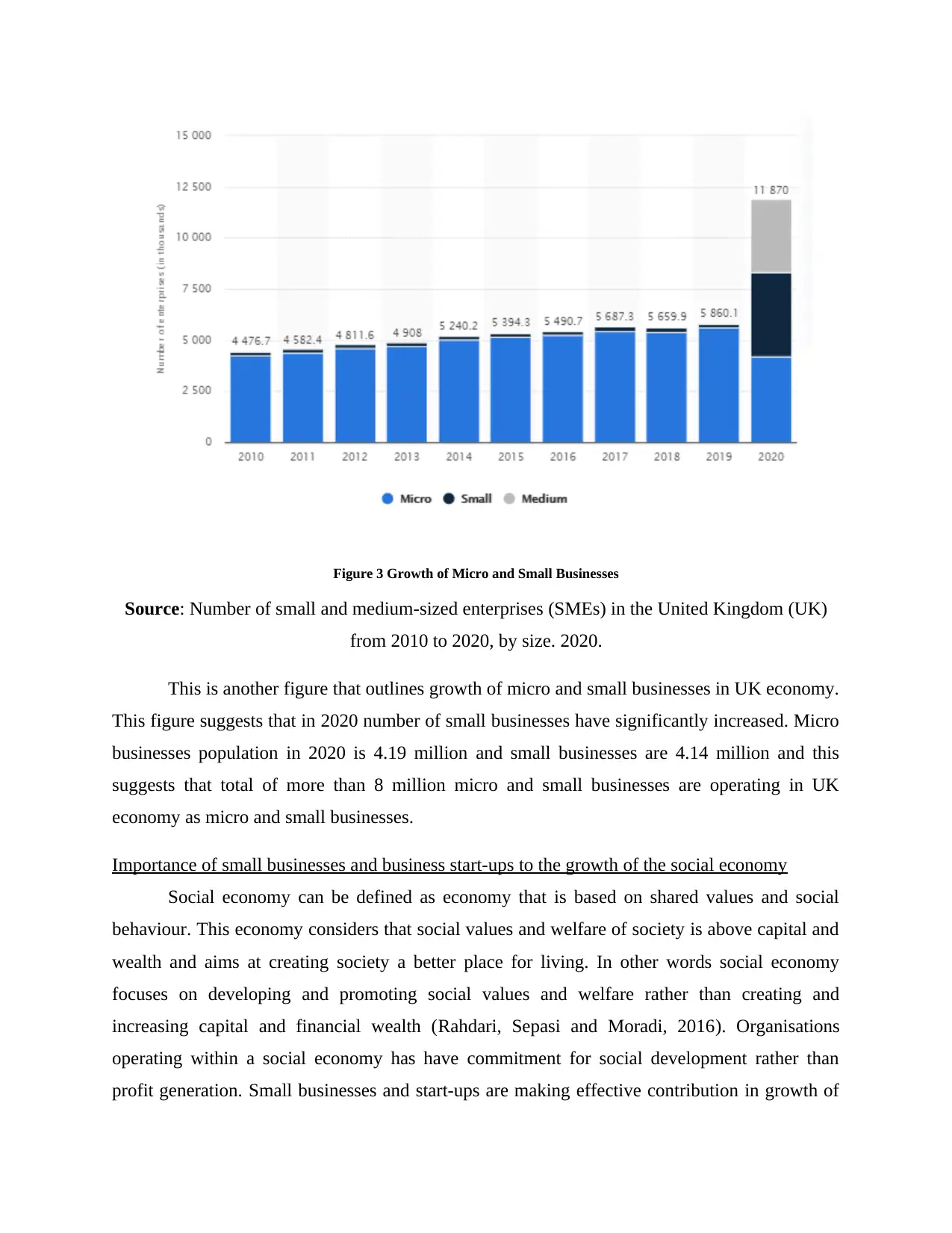
Figure 3 Growth of Micro and Small Businesses
Source: Number of small and medium-sized enterprises (SMEs) in the United Kingdom (UK)
from 2010 to 2020, by size. 2020.
This is another figure that outlines growth of micro and small businesses in UK economy.
This figure suggests that in 2020 number of small businesses have significantly increased. Micro
businesses population in 2020 is 4.19 million and small businesses are 4.14 million and this
suggests that total of more than 8 million micro and small businesses are operating in UK
economy as micro and small businesses.
Importance of small businesses and business start-ups to the growth of the social economy
Social economy can be defined as economy that is based on shared values and social
behaviour. This economy considers that social values and welfare of society is above capital and
wealth and aims at creating society a better place for living. In other words social economy
focuses on developing and promoting social values and welfare rather than creating and
increasing capital and financial wealth (Rahdari, Sepasi and Moradi, 2016). Organisations
operating within a social economy has have commitment for social development rather than
profit generation. Small businesses and start-ups are making effective contribution in growth of
Source: Number of small and medium-sized enterprises (SMEs) in the United Kingdom (UK)
from 2010 to 2020, by size. 2020.
This is another figure that outlines growth of micro and small businesses in UK economy.
This figure suggests that in 2020 number of small businesses have significantly increased. Micro
businesses population in 2020 is 4.19 million and small businesses are 4.14 million and this
suggests that total of more than 8 million micro and small businesses are operating in UK
economy as micro and small businesses.
Importance of small businesses and business start-ups to the growth of the social economy
Social economy can be defined as economy that is based on shared values and social
behaviour. This economy considers that social values and welfare of society is above capital and
wealth and aims at creating society a better place for living. In other words social economy
focuses on developing and promoting social values and welfare rather than creating and
increasing capital and financial wealth (Rahdari, Sepasi and Moradi, 2016). Organisations
operating within a social economy has have commitment for social development rather than
profit generation. Small businesses and start-ups are making effective contribution in growth of
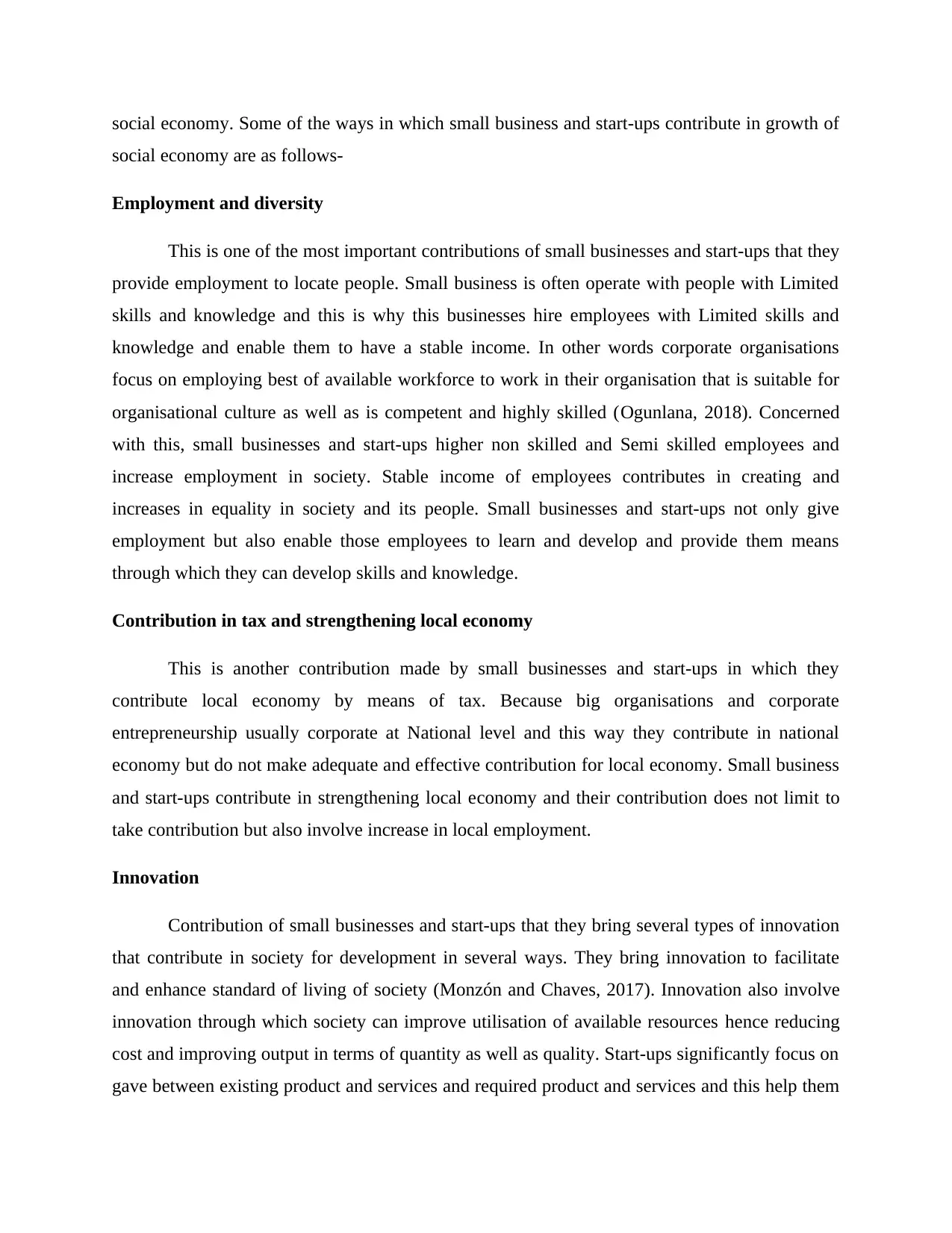
social economy. Some of the ways in which small business and start-ups contribute in growth of
social economy are as follows-
Employment and diversity
This is one of the most important contributions of small businesses and start-ups that they
provide employment to locate people. Small business is often operate with people with Limited
skills and knowledge and this is why this businesses hire employees with Limited skills and
knowledge and enable them to have a stable income. In other words corporate organisations
focus on employing best of available workforce to work in their organisation that is suitable for
organisational culture as well as is competent and highly skilled (Ogunlana, 2018). Concerned
with this, small businesses and start-ups higher non skilled and Semi skilled employees and
increase employment in society. Stable income of employees contributes in creating and
increases in equality in society and its people. Small businesses and start-ups not only give
employment but also enable those employees to learn and develop and provide them means
through which they can develop skills and knowledge.
Contribution in tax and strengthening local economy
This is another contribution made by small businesses and start-ups in which they
contribute local economy by means of tax. Because big organisations and corporate
entrepreneurship usually corporate at National level and this way they contribute in national
economy but do not make adequate and effective contribution for local economy. Small business
and start-ups contribute in strengthening local economy and their contribution does not limit to
take contribution but also involve increase in local employment.
Innovation
Contribution of small businesses and start-ups that they bring several types of innovation
that contribute in society for development in several ways. They bring innovation to facilitate
and enhance standard of living of society (Monzón and Chaves, 2017). Innovation also involve
innovation through which society can improve utilisation of available resources hence reducing
cost and improving output in terms of quantity as well as quality. Start-ups significantly focus on
gave between existing product and services and required product and services and this help them
social economy are as follows-
Employment and diversity
This is one of the most important contributions of small businesses and start-ups that they
provide employment to locate people. Small business is often operate with people with Limited
skills and knowledge and this is why this businesses hire employees with Limited skills and
knowledge and enable them to have a stable income. In other words corporate organisations
focus on employing best of available workforce to work in their organisation that is suitable for
organisational culture as well as is competent and highly skilled (Ogunlana, 2018). Concerned
with this, small businesses and start-ups higher non skilled and Semi skilled employees and
increase employment in society. Stable income of employees contributes in creating and
increases in equality in society and its people. Small businesses and start-ups not only give
employment but also enable those employees to learn and develop and provide them means
through which they can develop skills and knowledge.
Contribution in tax and strengthening local economy
This is another contribution made by small businesses and start-ups in which they
contribute local economy by means of tax. Because big organisations and corporate
entrepreneurship usually corporate at National level and this way they contribute in national
economy but do not make adequate and effective contribution for local economy. Small business
and start-ups contribute in strengthening local economy and their contribution does not limit to
take contribution but also involve increase in local employment.
Innovation
Contribution of small businesses and start-ups that they bring several types of innovation
that contribute in society for development in several ways. They bring innovation to facilitate
and enhance standard of living of society (Monzón and Chaves, 2017). Innovation also involve
innovation through which society can improve utilisation of available resources hence reducing
cost and improving output in terms of quantity as well as quality. Start-ups significantly focus on
gave between existing product and services and required product and services and this help them
⊘ This is a preview!⊘
Do you want full access?
Subscribe today to unlock all pages.

Trusted by 1+ million students worldwide
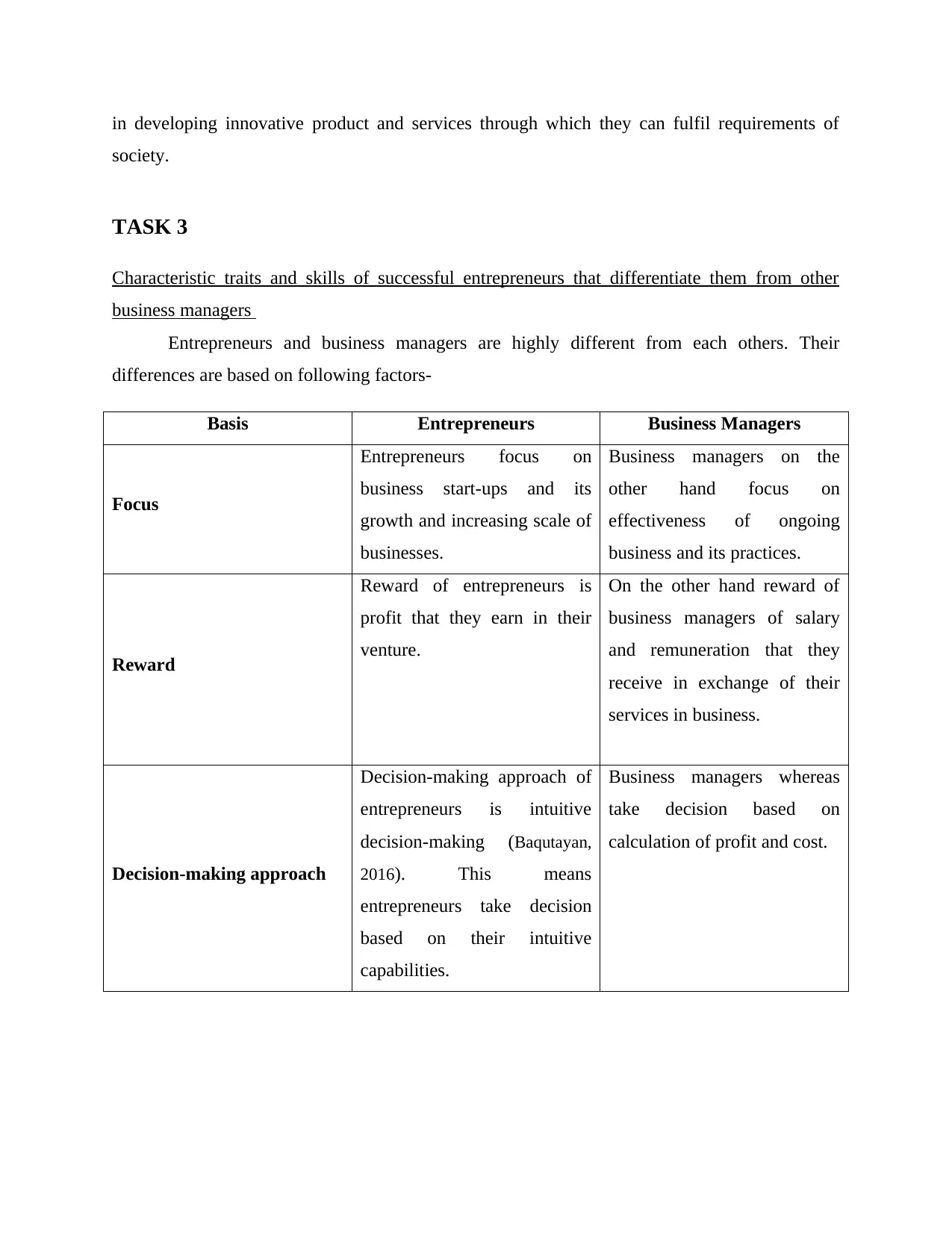
in developing innovative product and services through which they can fulfil requirements of
society.
TASK 3
Characteristic traits and skills of successful entrepreneurs that differentiate them from other
business managers
Entrepreneurs and business managers are highly different from each others. Their
differences are based on following factors-
Basis Entrepreneurs Business Managers
Focus
Entrepreneurs focus on
business start-ups and its
growth and increasing scale of
businesses.
Business managers on the
other hand focus on
effectiveness of ongoing
business and its practices.
Reward
Reward of entrepreneurs is
profit that they earn in their
venture.
On the other hand reward of
business managers of salary
and remuneration that they
receive in exchange of their
services in business.
Decision-making approach
Decision-making approach of
entrepreneurs is intuitive
decision-making (Baqutayan,
2016). This means
entrepreneurs take decision
based on their intuitive
capabilities.
Business managers whereas
take decision based on
calculation of profit and cost.
society.
TASK 3
Characteristic traits and skills of successful entrepreneurs that differentiate them from other
business managers
Entrepreneurs and business managers are highly different from each others. Their
differences are based on following factors-
Basis Entrepreneurs Business Managers
Focus
Entrepreneurs focus on
business start-ups and its
growth and increasing scale of
businesses.
Business managers on the
other hand focus on
effectiveness of ongoing
business and its practices.
Reward
Reward of entrepreneurs is
profit that they earn in their
venture.
On the other hand reward of
business managers of salary
and remuneration that they
receive in exchange of their
services in business.
Decision-making approach
Decision-making approach of
entrepreneurs is intuitive
decision-making (Baqutayan,
2016). This means
entrepreneurs take decision
based on their intuitive
capabilities.
Business managers whereas
take decision based on
calculation of profit and cost.
Paraphrase This Document
Need a fresh take? Get an instant paraphrase of this document with our AI Paraphraser
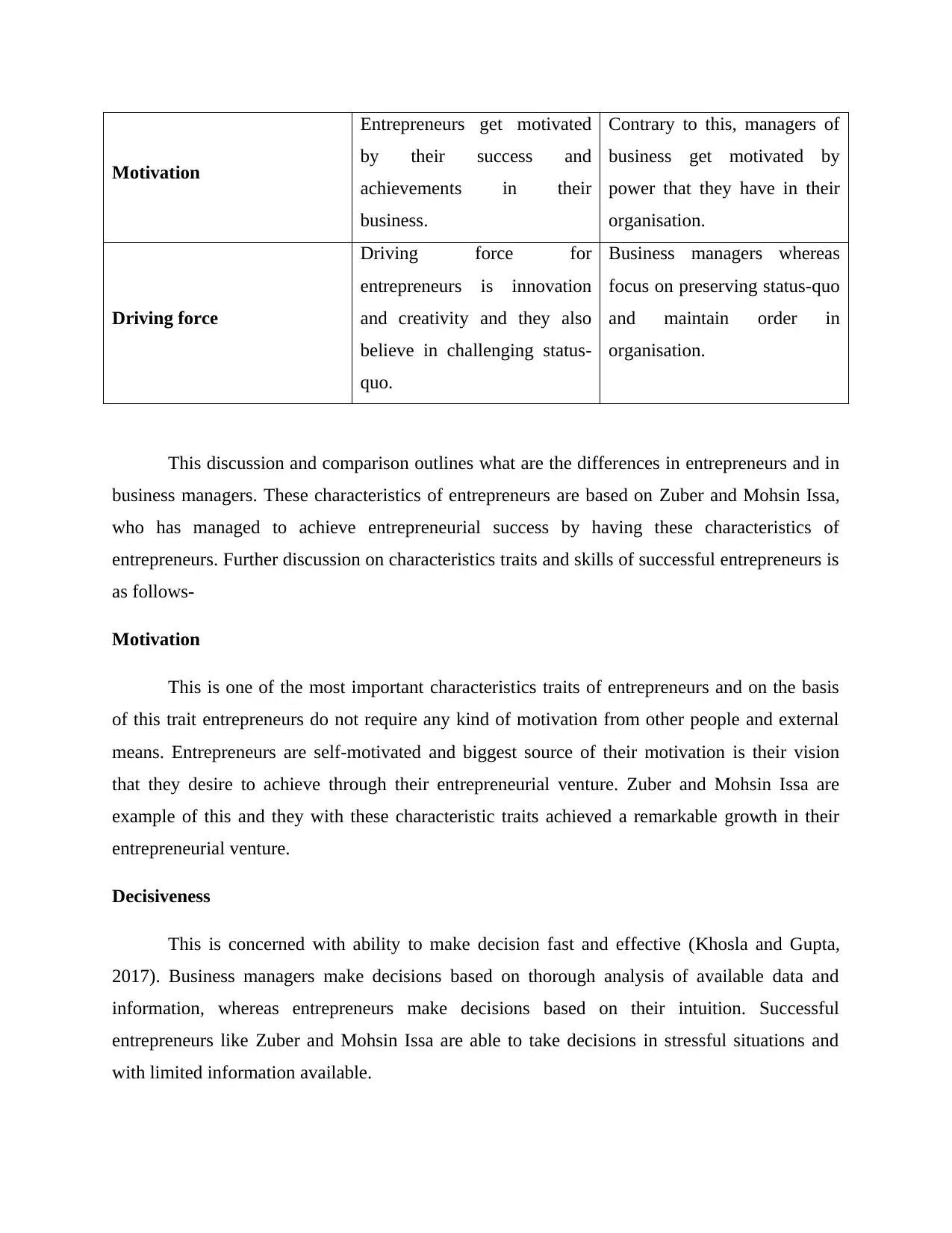
Motivation
Entrepreneurs get motivated
by their success and
achievements in their
business.
Contrary to this, managers of
business get motivated by
power that they have in their
organisation.
Driving force
Driving force for
entrepreneurs is innovation
and creativity and they also
believe in challenging status-
quo.
Business managers whereas
focus on preserving status-quo
and maintain order in
organisation.
This discussion and comparison outlines what are the differences in entrepreneurs and in
business managers. These characteristics of entrepreneurs are based on Zuber and Mohsin Issa,
who has managed to achieve entrepreneurial success by having these characteristics of
entrepreneurs. Further discussion on characteristics traits and skills of successful entrepreneurs is
as follows-
Motivation
This is one of the most important characteristics traits of entrepreneurs and on the basis
of this trait entrepreneurs do not require any kind of motivation from other people and external
means. Entrepreneurs are self-motivated and biggest source of their motivation is their vision
that they desire to achieve through their entrepreneurial venture. Zuber and Mohsin Issa are
example of this and they with these characteristic traits achieved a remarkable growth in their
entrepreneurial venture.
Decisiveness
This is concerned with ability to make decision fast and effective (Khosla and Gupta,
2017). Business managers make decisions based on thorough analysis of available data and
information, whereas entrepreneurs make decisions based on their intuition. Successful
entrepreneurs like Zuber and Mohsin Issa are able to take decisions in stressful situations and
with limited information available.
Entrepreneurs get motivated
by their success and
achievements in their
business.
Contrary to this, managers of
business get motivated by
power that they have in their
organisation.
Driving force
Driving force for
entrepreneurs is innovation
and creativity and they also
believe in challenging status-
quo.
Business managers whereas
focus on preserving status-quo
and maintain order in
organisation.
This discussion and comparison outlines what are the differences in entrepreneurs and in
business managers. These characteristics of entrepreneurs are based on Zuber and Mohsin Issa,
who has managed to achieve entrepreneurial success by having these characteristics of
entrepreneurs. Further discussion on characteristics traits and skills of successful entrepreneurs is
as follows-
Motivation
This is one of the most important characteristics traits of entrepreneurs and on the basis
of this trait entrepreneurs do not require any kind of motivation from other people and external
means. Entrepreneurs are self-motivated and biggest source of their motivation is their vision
that they desire to achieve through their entrepreneurial venture. Zuber and Mohsin Issa are
example of this and they with these characteristic traits achieved a remarkable growth in their
entrepreneurial venture.
Decisiveness
This is concerned with ability to make decision fast and effective (Khosla and Gupta,
2017). Business managers make decisions based on thorough analysis of available data and
information, whereas entrepreneurs make decisions based on their intuition. Successful
entrepreneurs like Zuber and Mohsin Issa are able to take decisions in stressful situations and
with limited information available.
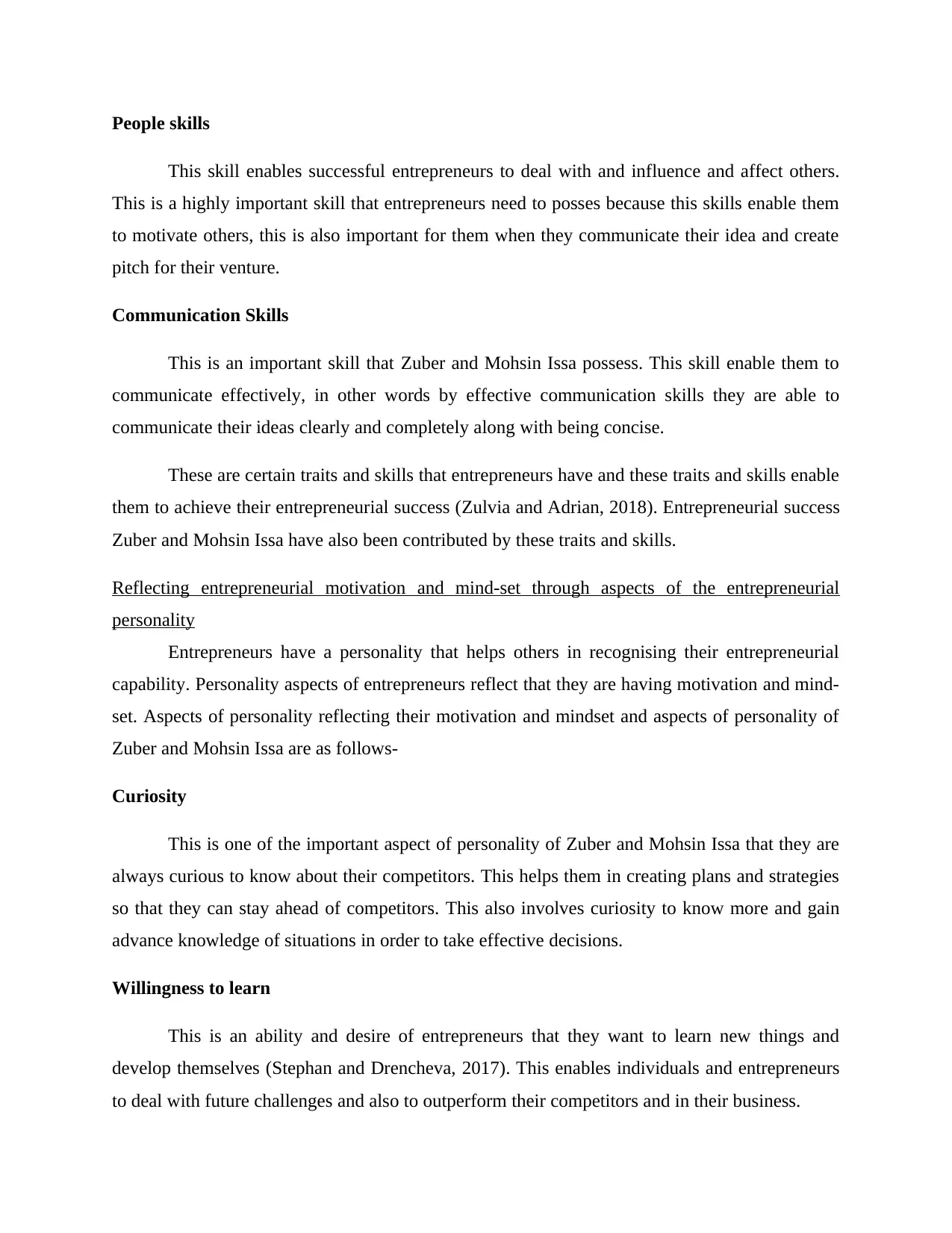
People skills
This skill enables successful entrepreneurs to deal with and influence and affect others.
This is a highly important skill that entrepreneurs need to posses because this skills enable them
to motivate others, this is also important for them when they communicate their idea and create
pitch for their venture.
Communication Skills
This is an important skill that Zuber and Mohsin Issa possess. This skill enable them to
communicate effectively, in other words by effective communication skills they are able to
communicate their ideas clearly and completely along with being concise.
These are certain traits and skills that entrepreneurs have and these traits and skills enable
them to achieve their entrepreneurial success (Zulvia and Adrian, 2018). Entrepreneurial success
Zuber and Mohsin Issa have also been contributed by these traits and skills.
Reflecting entrepreneurial motivation and mind-set through aspects of the entrepreneurial
personality
Entrepreneurs have a personality that helps others in recognising their entrepreneurial
capability. Personality aspects of entrepreneurs reflect that they are having motivation and mind-
set. Aspects of personality reflecting their motivation and mindset and aspects of personality of
Zuber and Mohsin Issa are as follows-
Curiosity
This is one of the important aspect of personality of Zuber and Mohsin Issa that they are
always curious to know about their competitors. This helps them in creating plans and strategies
so that they can stay ahead of competitors. This also involves curiosity to know more and gain
advance knowledge of situations in order to take effective decisions.
Willingness to learn
This is an ability and desire of entrepreneurs that they want to learn new things and
develop themselves (Stephan and Drencheva, 2017). This enables individuals and entrepreneurs
to deal with future challenges and also to outperform their competitors and in their business.
This skill enables successful entrepreneurs to deal with and influence and affect others.
This is a highly important skill that entrepreneurs need to posses because this skills enable them
to motivate others, this is also important for them when they communicate their idea and create
pitch for their venture.
Communication Skills
This is an important skill that Zuber and Mohsin Issa possess. This skill enable them to
communicate effectively, in other words by effective communication skills they are able to
communicate their ideas clearly and completely along with being concise.
These are certain traits and skills that entrepreneurs have and these traits and skills enable
them to achieve their entrepreneurial success (Zulvia and Adrian, 2018). Entrepreneurial success
Zuber and Mohsin Issa have also been contributed by these traits and skills.
Reflecting entrepreneurial motivation and mind-set through aspects of the entrepreneurial
personality
Entrepreneurs have a personality that helps others in recognising their entrepreneurial
capability. Personality aspects of entrepreneurs reflect that they are having motivation and mind-
set. Aspects of personality reflecting their motivation and mindset and aspects of personality of
Zuber and Mohsin Issa are as follows-
Curiosity
This is one of the important aspect of personality of Zuber and Mohsin Issa that they are
always curious to know about their competitors. This helps them in creating plans and strategies
so that they can stay ahead of competitors. This also involves curiosity to know more and gain
advance knowledge of situations in order to take effective decisions.
Willingness to learn
This is an ability and desire of entrepreneurs that they want to learn new things and
develop themselves (Stephan and Drencheva, 2017). This enables individuals and entrepreneurs
to deal with future challenges and also to outperform their competitors and in their business.
⊘ This is a preview!⊘
Do you want full access?
Subscribe today to unlock all pages.

Trusted by 1+ million students worldwide
1 out of 18
Related Documents
Your All-in-One AI-Powered Toolkit for Academic Success.
+13062052269
info@desklib.com
Available 24*7 on WhatsApp / Email
![[object Object]](/_next/static/media/star-bottom.7253800d.svg)
Unlock your academic potential
Copyright © 2020–2026 A2Z Services. All Rights Reserved. Developed and managed by ZUCOL.




